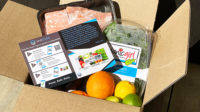C-Suite Q&A: Alex Worley, CEO of Happy Egg Co.

From their distinctively different Heritage eggs to their certified Organic and signature Free Range eggs, Happy Eggs are known for their uniquely plump, golden or amber yolks. Courtesy Happy Egg Co.

From Heritage eggs to certified Organic, Vitamin Plus and signature Free Range eggs, Happy Eggs are laid by hens given year-round access to the outdoors on 21.8 square feet of range per bird. Courtesy Happy Egg Co.

Alex Worley, CEO of Happy Egg Co. Courtesy Happy Egg Co.



Happy Egg Co. is the No. 1 free-range brand in the U.S., according to Nielsen, working with small farms across the Ozarks and Midwest to produce American Humane Certified eggs.
Laid by hens given year-round access to the outdoors on 21.8 square feet of range per bird, plus daily care from farmers, Happy Egg Co.’s eggs are found nationwide at retailers including Kroger, Sprouts, Stater Bros. and Walmart.
From their distinctively different Heritage eggs to their certified Organic and signature Free Range eggs, Happy Eggs are known for their uniquely plump, golden or amber yolks.
What is the “yolk color score” and how does Happy Egg stack up?
The yolk color score, or Roche Scale, is used to grade the color of egg yolks from pale, light yellow (a 1 on the Roche Scale) to dark, rich amber, with the highest score being a 16. Internally, we use this score regularly to ensure our farms are meeting our high standards of care for our birds, providing them with nutritious feed and daily access to farmland to roam. Our Happy Egg Free Range and Free Range Organic products fall around a 12 or 13 on the Roche Scale, while our Heritage product lands around 14 or 15. In comparison, many conventional eggs laid by hens who don’t see the outdoors or don’t receive humane care will fall at a 5 or below.
Happy Egg is proud of how its eggs are produced and the hens are raised – what are some of the methods that set Happy Egg apart?
All Happy Egg farms, regardless of which breed of hens they are raising, provide 10x more space than most free-range farms, and we intentionally partner with small, family farmers to raise our hens this way. We could give our hens less space and have our eggs still be considered free range, but we choose to give them more space to roam and choose to partner with farmers that provide thoughtful care that often goes above even our own internal standards for hen care. We are constantly in awe of our farmers and the heart they put into their farms and birds.
The Happy Egg website includes lots of interesting ways to use eggshells – even a recipe for making chalk! What sustainability initiatives does Happy Egg employ in its processing and packaging operations?
We are always looking for ways to drive efficiency across our business, while keeping sustainability in mind. One of Happy Egg’s most distinct and recognizable assets is our bright yellow carton, which are made of recycled pulp paper and are fully biodegradable, making them a great sustainable alternative to the plastic or Styrofoam cartons you often see on shelves.
What’s on the horizon for Happy Egg?
We are currently in the thick of recruiting and establishing new Happy Egg farmers, identifying the right individuals to come alongside us as we raise the standard for humane hen care; we won’t be slowing down on these efforts into the coming year, and look forward to partnering with more incredible farmers as we grow. This past year, we also introduced an 18-count pack of our signature Free Range and Free Range Organic products to better meet the growing demand from larger families, athletes, or those who are in-taking more eggs than the average household is.
Looking for a reprint of this article?
From high-res PDFs to custom plaques, order your copy today!









